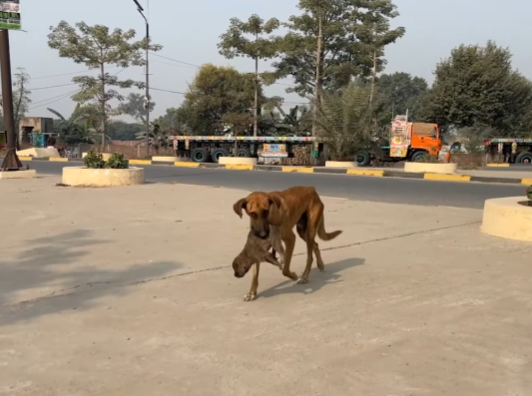
For three long days, she waited.
On the side of a dusty rural road, beneath an old tamarind tree whose branches offered only a thin slice of shade, a small, golden-brown dog curled into herself. Her ribs showed through her fur, and her eyes—usually bright with excitement—had grown dull, reflecting heartbreak rather than hope. She didn’t move much. She barely even blinked. She was waiting. Waiting for the only person she had ever trusted. Waiting for the human who drove away and never came back.
The first day, she didn’t understand.
The squeak of the car door, the gentle pat on her head, the soft whisper, “Stay here, girl.” She obeyed, tail wagging, believing they would return as they always did. She watched the dusty white truck roll away, its engine humming as it disappeared down the winding road. She waited expectantly, her tail still sweeping back and forth against the dirt. Every few minutes she’d lift her head, ears perking, listening for the familiar sound of tires crunching gravel.
But the hours dragged on. No footsteps. No voice. No car.
Yet she didn’t move. She believed.
By evening, she grew thirsty. Her tongue hung dry from her mouth, but she stayed put. A passing cyclist slowed down, confused by the sight of a dog sitting alone with such unwavering stillness. He tried to approach, but the dog backed away—just slightly—never leaving the boundary where she had been left. She wasn’t aggressive. She wasn’t afraid. She was simply waiting for the one person she thought would return.
That night, darkness fell. The crickets sang. The wind cooled the air. And still, she stayed.
On the second day, the pain began.
Her stomach growled from hunger, twisting painfully. She hadn’t eaten since the morning before. Flies buzzed around her, landing on her eyes and nose, but she barely had the strength to shoo them away. She lay curled by the tree, shivering each time a car whooshed past, lifting her head in weak hope.
A blue van? Not him.
A motorcycle? Too loud. Not him.

A red pickup slowed as if to stop. Her tail lifted faintly. She stood up, wobbling, ears perked.
But the truck rolled on.
Disappointment crushed her fragile spirit. Her legs trembled under the weight of three simple emotions—fear, confusion, and longing. She didn’t understand why he hadn’t returned. She didn’t understand why she was alone. She didn’t understand where she was supposed to go.
All she knew was that she had to stay. Because maybe he was coming back. Maybe he was just late. Maybe he still cared.
By afternoon, another passerby tried to help—this time, a woman with kind eyes who set down a bowl of water and whispered softly, “Come here, sweet girl.” But the dog didn’t move. She only stared at the bowl, too weak to stand but too loyal to abandon the spot where she was last loved.
Her loyalty was killing her.
That night, rain came. Heavy, unforgiving rain that pounded the earth and drenched her thin fur. She crawled beneath the roots of the tamarind tree, pressing herself close to the trunk for shelter. Cold shivers racked her tiny body. Lightning flashed, and thunder cracked through the sky. Each time, she flinched and looked down the road.
Still no one.
She whimpered softly, not from fear, but from the pain of waiting.
On the third day, she lost the strength to stand.
The sun rose slowly, warm and bright, but she didn’t lift her head to greet it. Her eyes were half-closed, her breathing shallow. She felt weak, empty, and hollow—like a shadow of the dog she once was. Her hope flickered like a dying flame, soft and wavering.
Cars passed occasionally, sending bursts of dust into the air. Each sound awakened something inside her, but her body wouldn’t respond anymore. She tried to move, but her legs refused. She tried to bark, but her voice came out as barely a whisper.
It was then that a man happened to drive by—a man who rescued injured animals whenever he could, though he wasn’t part of any organization. Just someone with a heart too big for his own good.

He noticed her immediately.
A still form under the tree. Too still.
His chest tightened. He pulled over quickly, stepping out with caution but determination. “Hey, girl,” he called gently.
Her ears twitched.
“You okay?”
She blinked.
As he approached, he saw the truth—the hunger, the dehydration, the exhaustion, the brokenness. But he also saw something else: the way she kept looking down the road, waiting for someone other than him. Someone she loved.
“Oh sweetheart,” he murmured, his voice breaking. “How long have you been waiting?”
He kneeled down, slowly extending his hand. She sniffed weakly. She didn’t have the strength to resist, but the trust in her eyes was fragile, like glass ready to shatter.
“I won’t hurt you,” he whispered. “Let me help.”
He brought water first, dripping it into her mouth. She swallowed in small, desperate gulps. Then he offered food—soft and easy to chew. A faint spark appeared in her eyes.
He carefully lifted her into his arms. She didn’t fight. She simply looked down the road one last time, as if hoping—praying—that her human would come for her.
But no one did.

So she rested her head against the chest of the man who had finally stopped.
He took her to his home, warmed her, fed her, and tended to her wounds. It took days before she stood properly again, weeks before she wagged her tail with confidence, and months before she fully believed she wasn’t going to be abandoned ever again.
But slowly, steadily, she healed.
The man didn’t just rescue her—he loved her. The way she deserved to be loved from the beginning. She learned to sleep without fear, to eat without trembling, and to walk without constantly looking over her shoulder.
And one evening, when the sunset painted the sky gold, she lay beside him, head resting peacefully on his lap. He stroked her fur gently.
“You don’t have to wait anymore,” he whispered.
And for the first time since the day she was left under that tamarind tree…
She believed him.
She didn’t look down the road again.
She was finally home.



